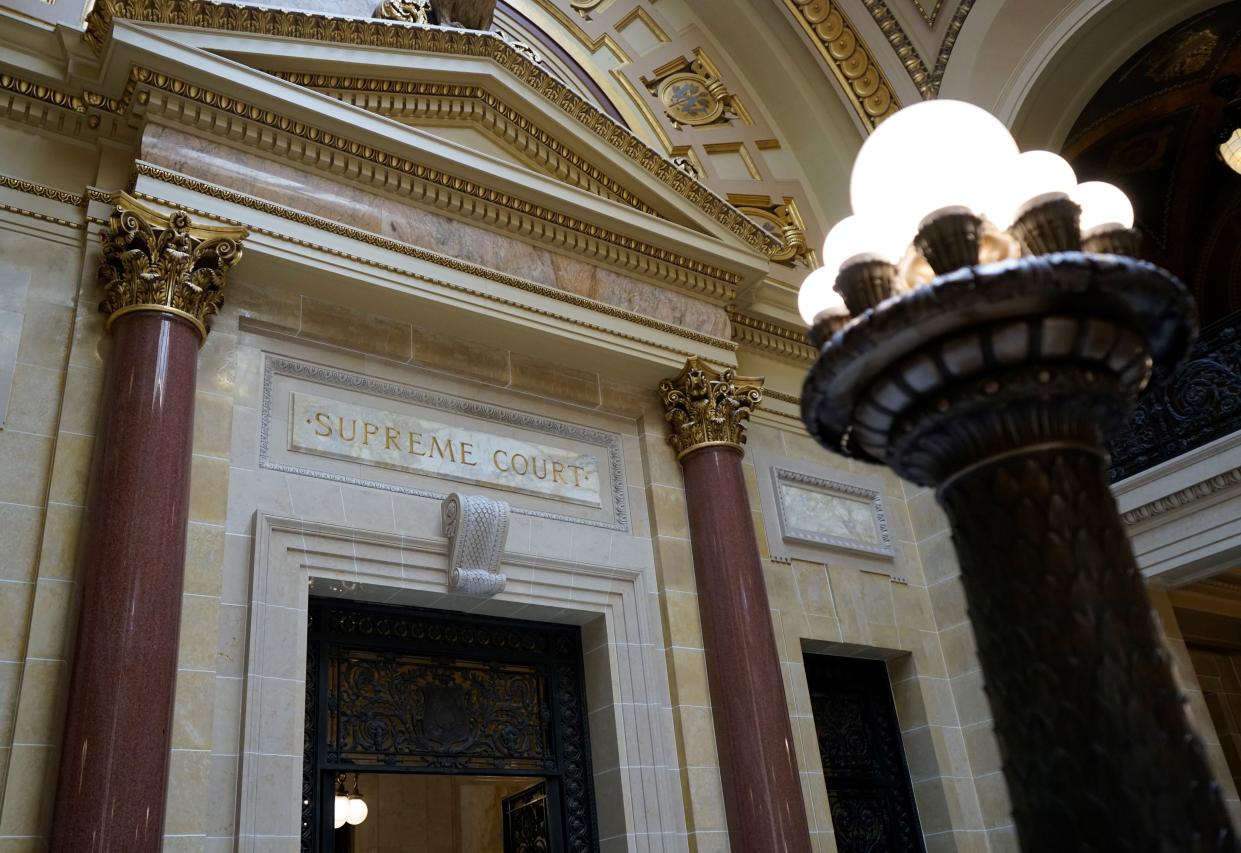In new Supreme Court filings, battle lines are drawn in the fight over Wisconsin's elections maps

- Oops!Something went wrong.Please try again later.
- Oops!Something went wrong.Please try again later.
MADISON — Wisconsin's electoral maps are "unsalvageable" and "infected" with partisan bias, attorneys for Democratic voters and Gov. Tony Evers argued in new court filings with the state Supreme Court.
Attorneys for the voters who brought the suit in August, after the court flipped to a liberal majority, are asking justices to declare the state's legislative districts unconstitutional and order new maps drawn based on "traditional redistricting criteria" in addition to what's required under state law by mid-March 2024.
"That remedy cannot be a partisan gerrymander in intent or in effect," attorneys for the voters argued.
“The entire point of redistricting is to serve democracy: it should empower voters, not the opposite,” attorneys representing Evers, including Attorney General Josh Kaul, argued in their filing with the court Monday.
Such a ruling would put every member of the Legislature up for reelection next year.
Attorneys for Republican senators named in the suit called the challenge a "collateral attack" on a previous state Supreme Court ruling on the state's voting maps, asking "the Court’s new majority to transform itself into a super-legislature."
Law Forward, a Madison-based liberal-leaning law firm focused on voting issues, filed the challenge directly with the Supreme Court, bypassing lower courts, immediately after liberal Justice Janet Protasiewicz was sworn in.
The lawsuit, brought by 19 Wisconsin residents, argues that by adopting a set of maps Evers vetoed in 2021, the state Supreme Court violated separation of powers rules. It also argues the maps violate the state's Constitution because some districts include pieces of land that are not connected, like Senate District 22 in the southeastern area of the state and Senate Districts 16 and 26 in Madison.
The Wisconsin Elections Commission and state senators representing odd-numbered districts are named as respondents in the lawsuit. Additional parties, including Evers, have intervened.
Attorneys for the Republican senators urged the court to dismiss the lawsuit and "reject the invitation to exercise raw political power."
The challenge relies on a legal remedy known as a writ of quo warranto, which can be used to challenge a lawmaker's right to hold office. If the lawsuit is successful, it will force the senators to run in new districts in a special election in 2024 for a new two-year term despite being in the middle of a four-year term.
Political districts typically are redrawn once every 10 years, following the completion of the U.S. Census. The legislative districts must have equal populations, but the district boundaries can confer advantages on one political party over another.
The current maps tilt heavily in Republicans’ favor, with 63 of the 99 Assembly seats and 23 of the 33 Senate seats leaning toward the GOP, according to a 2021 analysis by the Milwaukee Journal Sentinel.
Evers and Republicans who control the Legislature couldn't agree on new maps following the most recent U.S. Census, so it fell to the state Supreme Court to decide on the districts. In a 4-3 ruling in 2022, the justices picked Evers' maps, which had a Republican tilt to them even though they were drawn by a Democrat.
Republican lawmakers appealed to the U.S. Supreme Court, which found the state court had not provided enough evidence justifying why the state was increasing the number of Assembly districts with Black majorities in Milwaukee from six to seven.
The U.S. Supreme Court left in place the congressional district boundaries drawn by Evers and approved by the state Supreme Court. The 2022 decision by the state court affects only races for the state Legislature.
Earlier this month, Protasiewicz rejected calls from GOP legislative leaders to recuse herself from the lawsuit after referring to the state's electoral maps on the campaign trail as "rigged" — a decision Assembly Speaker Robin Vos has warned could push him to start impeachment proceedings.
Under state law, impeachment is reserved for corruption in office or for crimes and misdemeanors.
Wisconsin's Code of Judicial Ethics contains a unique provision that says a judge "shall not be required" to recuse based solely on an endorsement or campaign contribution. Wisconsin's rules require recusal in situations including when the judge or an immediate family member has a significant financial interest in the case's outcome, or if the judge has made “pledges, promises, or commitments” to rule in a particular way.
Oral arguments in the case are scheduled for Nov. 21.
More: Gilbert: Are Wisconsin's election maps 'rigged'? Here are the reasons the answer is yes
Jessie Opoien can be reached at jessie.opoien@jrn.com.
THANK YOU: Subscribers' support makes this work possible. Help us share the knowledge by buying a gift subscription.
DOWNLOAD THE APP: Get the latest news, sports and more
This article originally appeared on Milwaukee Journal Sentinel: Court filings lay out arguments in fight over Wisconsin election maps

